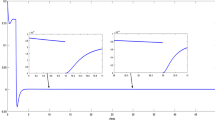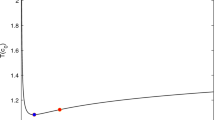Abstract
This paper aims to design an appropriate switching law to stabilize the switched neural networks with time-varying delays when all subsystems are unstable. By using the discretized Lyapunov function approach and the extended comparison principle for impulsive systems, the stability of switched delayed neural networks composed full of unstable subsystems is analyzed and a computable sufficient condition is derived in the framework of dwell time. The effectiveness of the proposed results is illustrated by a numerical example.


Similar content being viewed by others
References
Hirsch MW (1989) Convergent activation dynamics in continuous time networks. Neural Netw 2(5):331–349
Hopfield JJ, Tank DW (1986) Computing with neural circuits—a model. Science 233(4764):625–633
He X, Li C, Huang T et al (2014) Neural network for solving convex quadratic bilevel programming problems. Neural Netw 51:17–25
He X, Li C, Huang T et al (2014) A recurrent neural network for solving bilevel linear programming problem. Neural Netw Learn Syst IEEE Trans 25(4):824–830
Wen S, Huang T, Zeng Z et al (2015) Circuit design and exponential stabilization of memristive neural networks. Neural Netw 63:48–56
Li C, Li C, Liao X et al (2011) Impulsive effects on stability of high-order BAM neural networks with time delays. Neurocomputing 74(10):1541–1550
Li C, Yu W, Huang T (2014) Impulsive synchronization schemes of stochastic complex networks with switching topology: average time approach. Neural Netw 54:85–94
Wen S, Zeng Z, Huang T et al (2014) Exponential adaptive lag synchronization of memristive neural networks via fuzzy method and applications in pseudorandom number generators. Fuzzy Syst IEEE Trans 22(6):1704–1713
Cao J, Liang J (2004) Boundedness and stability for Cohen–Grossberg neural network with time-varying delays. J Math Anal Appl 296(2):665–685
Li X, Song S (2013) Impulsive control for existence, uniqueness, and global stability of periodic solutions of recurrent neural networks with discrete and continuously distributed delays. Neural Netw Learn Syst IEEE Trans 24(6):868–877
Cao J, Wang J (2005) Global asymptotic and robust stability of recurrent neural networks with time delays. Circuits Syst I Regul Pap IEEE Trans 52(2):417–426
Zhang W, Tang Y, Fang J et al (2012) Stability of delayed neural networks with time-varying impulses. Neural Netw 36:59–63
Lin H, Antsaklis PJ (2009) Stability and stabilizability of switched linear systems: a survey of recent results. Autom Control IEEE Trans 54(2):308–322
Yuan K, Cao J, Li HX (2006) Robust stability of switched Cohen–Grossberg neural networks with mixed time-varying delays. Syst Man Cybern Part B Cybern IEEE Trans 36(6):1356–1363
Huang H, Qu Y, Li HX (2005) Robust stability analysis of switched Hopfield neural networks with time-varying delay under uncertainty. Phys Lett A 345(4):345–354
Wu ZG, Shi P, Su H et al (2011) Delay-dependent stability analysis for switched neural networks with time-varying delay. Syst Man Cybern Part B Cybern IEEE Trans 41(6):1522–1530
Zhu Q, Cao J (2010) Robust exponential stability of Markovian jump impulsive stochastic Cohen–Grossberg neural networks with mixed time delays. Neural Netw IEEE Trans 21(8):1314–1325
Li C, Gao DY, Liu C et al (2014) Impulsive control for synchronizing delayed discrete complex networks with switching topology. Neural Comput Appl 24(1):59–68
Wu ZG, Shi P, Su H et al (2011) Passivity analysis for discrete-time stochastic Markovian jump neural networks with mixed time delays. Neural Netw IEEE Trans 22(10):1566–1575
Li C, Gang Feng G, Huang T (2011) On hybrid impulsive and switching neural networks. QNRS Repository 2011(1)
Zhang W, Tang Y, Miao Q et al (2013) Exponential synchronization of coupled switched neural networks with mode-dependent impulsive effects. Neural Netw Learn Syst IEEE Trans 24(8):1316–1326
Wu X, Tang Y, Zhang W (2014) Stability analysis of switched stochastic neural networks with time-varying delays. Neural Netw 51:39–49
Feng W, Tian J, Zhao P (2011) Stability analysis of switched stochastic systems. Automatica 47(1):148–157
Li ZG, Wen CY, Soh YC (2001) Stabilization of a class of switched systems via designing switching laws. IEEE Trans Autom Control 46(4):665–670
Zhang H, Wu Z, Xia Y (2014) Exponential stability of stochastic systems with hysteresis switching. Automatica 50(2):599–606
Wu Z, Cui M, Shi P et al (2013) Stability of stochastic nonlinear systems with state-dependent switching. Autom Control IEEE Trans 58(8):1904–1918
Xiang W, Xiao J (2014) Stabilization of switched continuous-time systems with all modes unstable via dwell time switching. Automatica 50(3):940–945
Chen WH, Wei D, Zheng WX (2013) Delayed impulsive control of Takagi-Sugeno fuzzy delay systems. Fuzzy Syst IEEE Trans 21(3):516–526
Zhang W, Tang Y, Wu X et al (2014) Synchronization of nonlinear dynamical networks with heterogeneous impulses. Circuits Syst I Regul Pap IEEE Trans 61(4):1220–1228
Zhao X, Yin S, Li H et al (2014) Switching Stabilization for a class of slowly switched systems. IEEE Trans Autom Control 99:0018–9286
Boyd S, El Ghaoui L, Feron E et al (1994) Linear matrix inequalities in systems and control. SIAM, Philadelphia
Gahinet PM, Nemirovskii A, Laub AJ et al (1994) The LMI control toolbox. IEEE Conf Decis Control 2:2038–2038
Acknowledgments
This publication was made possible by NPRP Grant No. NPRP 4-1162-1-181 from the Qatar National Research Fund (a member of Qatar Foundation). The statements made herein are solely the responsibility of the authors. This work was also supported by Natural Science Foundation of China (Grant Nos: 61374078, 61403313).
Author information
Authors and Affiliations
Corresponding author
Rights and permissions
About this article
Cite this article
Qi, J., Li, C., Huang, T. et al. Exponential Stability of Switched Time-varying Delayed Neural Networks with All Modes Being Unstable. Neural Process Lett 43, 553–565 (2016). https://doi.org/10.1007/s11063-015-9428-3
Published:
Issue Date:
DOI: https://doi.org/10.1007/s11063-015-9428-3




